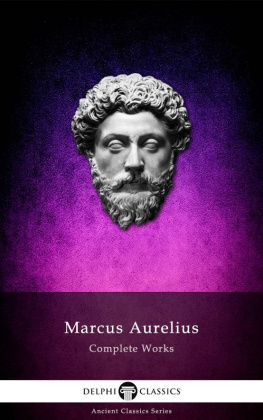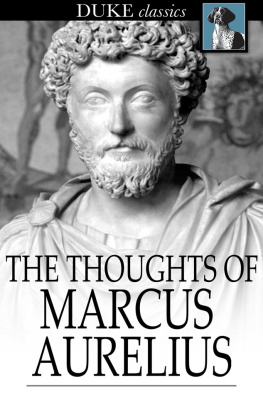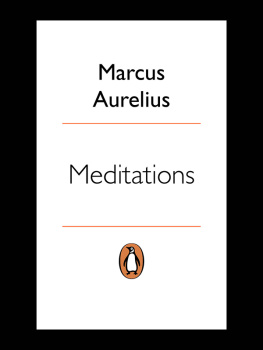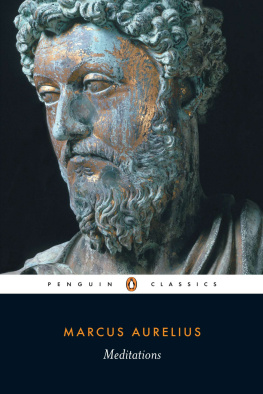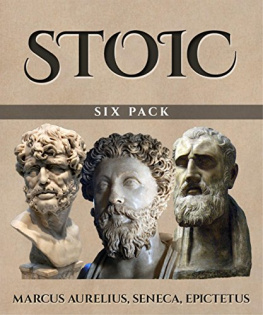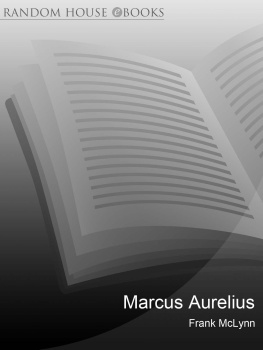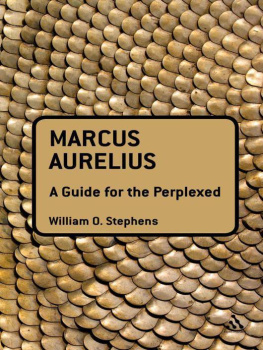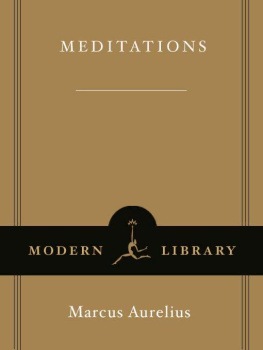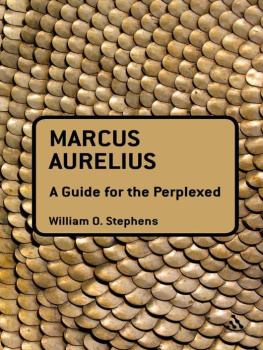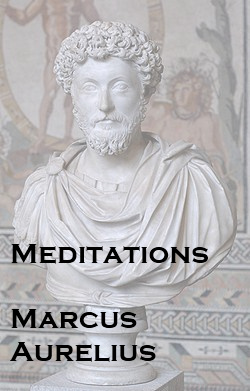Marcus Aurelius - Thoughts
Here you can read online Marcus Aurelius - Thoughts full text of the book (entire story) in english for free. Download pdf and epub, get meaning, cover and reviews about this ebook. genre: Science. Description of the work, (preface) as well as reviews are available. Best literature library LitArk.com created for fans of good reading and offers a wide selection of genres:
Romance novel
Science fiction
Adventure
Detective
Science
History
Home and family
Prose
Art
Politics
Computer
Non-fiction
Religion
Business
Children
Humor
Choose a favorite category and find really read worthwhile books. Enjoy immersion in the world of imagination, feel the emotions of the characters or learn something new for yourself, make an fascinating discovery.
- Book:Thoughts
- Author:
- Genre:
- Rating:4 / 5
- Favourites:Add to favourites
- Your mark:
- 80
- 1
- 2
- 3
- 4
- 5
Thoughts: summary, description and annotation
We offer to read an annotation, description, summary or preface (depends on what the author of the book "Thoughts" wrote himself). If you haven't found the necessary information about the book — write in the comments, we will try to find it.
Thoughts — read online for free the complete book (whole text) full work
Below is the text of the book, divided by pages. System saving the place of the last page read, allows you to conveniently read the book "Thoughts" online for free, without having to search again every time where you left off. Put a bookmark, and you can go to the page where you finished reading at any time.
Font size:
Interval:
Bookmark:
The Project Gutenberg EBook of The Thoughts Of The Emperor Marcus AureliusAntoninus, by Marcus Aurelius#2 in our series by Marcus Aurelius
Copyright laws are changing all over the world. Be sure to check thecopyright laws for your country before downloading or redistributingthis or any other Project Gutenberg eBook.
This header should be the first thing seen when viewing this ProjectGutenberg file. Please do not remove it. Do not change or edit theheader without written permission.
Please read the "legal small print," and other information about theeBook and Project Gutenberg at the bottom of this file. Included isimportant information about your specific rights and restrictions inhow the file may be used. You can also find out about how to make adonation to Project Gutenberg, and how to get involved.
**Welcome To The World of Free Plain Vanilla Electronic Texts**
**eBooks Readable By Both Humans and By Computers, Since 1971**
*****These eBooks Were Prepared By Thousands of Volunteers!*****
Title: The Thoughts Of The Emperor Marcus Aurelius Antoninus
Author: Marcus Aurelius
Release Date: November, 2004 [EBook #6920][Yes, we are more than one year ahead of schedule][This file was first posted on February 10, 2003]
Edition: 10
Language: English
*** START OF THE PROJECT GUTENBERG EBOOK THOUGHTS OF MARCUS AURELIUS ***
Produced by Robert Nield, Tom Allen, Charles Franksand the Online Distributed Proofreading Team.
[TRANSCRIBER'S NOTE: All the footnotes have been moved to the end of thetext. I have also relabeled the book headings; [I., II., XI.] hasbeen changed to [BOOK I., BOOK II., BOOK XI.] at the start of eachSection. I have also added a "1. " before the first "thought" in eachBOOK.]
Perhaps some may question the wisdom of putting out the Thoughts ofMarcus Aurelius Antoninus to be used as a Reader by children in theschools. It may appear to them better suited to the mature mind. Theprinciple, however, that has governed us in selecting reading for theyoung has been to secure the best that we could find in all ages forgrown-up people. The milk and water diet provided for "my dear children"is not especially complimentary to them. They like to be treated likelittle men and women, capable of appreciating a good thing. One finds inthis royal philosopher a rare generosity, sweetness and humility,qualities alike suited to all ages.
Adopting the philosopher's robe at twelve, he remains a student all hislife. The precepts that he would give for the government of others, hehas practised upon himself. In his time, as in ours, there were goodphysicians for the mind and body, who could make wise prescriptions forthe government of their neighbors, but were unable to apply them tothemselves. The faults of our fellows are so numerous and so easy to curethat one is readily tempted to become the physician, while our own faultsare so few and so unimportant that it is hardly worth while to give anyattention to them. Hence we have a multitude of physicians for humanityin general, and a scarcity of individual healers.
It was the doctrine of Marcus Aurelius that most of the ills of life cometo us from our own imagination, that it was not in the power of othersseriously to interfere with the calm, temperate life of an individual,and that when a fellow being did anything to us that seemed unjust he wasacting in ignorance, and that instead of stirring up anger within us itshould stir our pity for him. Oftentimes by careful self-examination weshould find that the fault was more our own than that of our fellow, andour sufferings were rather from our own opinions than from anything real.The circle of man's knowledge is very limited, and the largest circles donot wholly include the smallest. They are intersecting and the segmentcommon to any two is very small. Whatever lies outside this space doesnot exist for both. Hence arise innumerable contests. The man having thelargest intelligence ought to be very generous to the other. Beingthankful that he has been blessed in so many ways, he should do all inhis power to enlighten his less favored fellow, rather than be angry withhim on account of his misfortune. Is he not sufficiently punished inbeing denied the light?
Assisting his uncle in the government of the great Roman Empire atseventeen, it was his aim constantly to restrain the power of the strongand to assist the weak. He studied the laws of his country, not forwisdom alone, but that he might make them more beneficial to his people.All his life he tried to bring his fellows to a higher level, and tothink charitably of each other. Occupying himself a palace he livedsimply, like other men. It was his greatest delight to retire to hiscountry home and there, dwelling among his books, to meditate upon thegreat problems of life. He claimed that a man's life should be valuedaccording to the value of the things to which he gave his attention. Ifhis whole thought was given to clothing, feeding and housing himselfcomfortably, he should be valued like other well-housed and well-fedanimals. He would, however, derive the greatest pleasure and benefit inthis life by acting in accordance with reason, which demands of everyhuman being that his highest faculties should govern all the rest, andthat each should see to it that he treated his fellow kindly andgenerously and that if he could not assist him to a higher level heshould at least not stand in his way. When he speaks of the shortness oftime and the value of fame, riches and power, for which men strive inthis world, he speaks not from the standpoint of one who would wish toobtain these things, but as a Roman emperor enjoying the highest honorsthat man might expect to attain in this world. He certainly was in aposition to speak intelligently concerning these matters, and hisopinions ought to have weight with the coming generations. Children maynot prefer to read such thoughts; perhaps the majority of children do notprefer the Bible to other books. Still, we all think it is well for themto be obliged to read it. Perhaps requiring the use of such literature inthe schools might be as valuable as the adding, subtracting, multiplyingand dividing of interminable numbers, the memorizing of all the capes,bays and rivers in the world, and the dates of all the battles that haveoccurred since the creation of man. We should strive to stimulate thethinking powers of children, leading them to form wise judgmentsconcerning the important things of life, without catering too much totheir own wishes at an age when they cannot form an intelligent opinionof what is best for themselves.
At our first reading of the Thoughts of Marcus Aurelius Antoninus, wemarked many sentences that appeared to us specially good; in the second,twice as many more. Where all is good it is hard to emphasize, but wewill cite just one of his reflections, as illustrating the trend of hismind: "I have often wondered," he says, "how it is that every man loveshimself more than all the rest of men, and yet sets less value on his ownopinion of himself than on the opinion of others."
We have given Long's translation of the Thoughts complete, as publishedby Messrs. Little, Brown & Co., but we have omitted some unimportantportions of the biography and philosophy in the interest of space andeconomy. We have also given the philosophy in a supplement, thinking itbetter that it should come after the Thoughts themselves. We shall issuea pocket edition on very thin paper for the convenience of such as wishto make a special study of the work. We also propose to issue a similaredition of the writings of Epictetus.
Next pageFont size:
Interval:
Bookmark:
Similar books «Thoughts»
Look at similar books to Thoughts. We have selected literature similar in name and meaning in the hope of providing readers with more options to find new, interesting, not yet read works.
Discussion, reviews of the book Thoughts and just readers' own opinions. Leave your comments, write what you think about the work, its meaning or the main characters. Specify what exactly you liked and what you didn't like, and why you think so.


